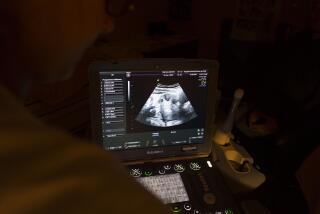Scientist Announces Plans for the First Human Clone
- Share via
A Chicago scientist says he has assembled a team of doctors prepared to clone a human being before Congress has a chance to ban the procedure, and says eight people have already volunteered to be cloned.
The scientist, G. Richard Seed, is a physicist with a PhD who has been involved in various kinds of fertility research since the early 1970s but has no university or research laboratory affiliation. Several people familiar with Seed said he is known for his eccentric views and doubted he would follow through with his plan. But others said Seed has the technical and entrepreneurial expertise--and philosophical commitment to radical science--to accomplish the feat.
“Richard is a brilliant man,” said Harrith Hasson, chairman of obstetrics and gynecology at the University of Chicago’s Weiss Memorial Hospital who has worked with Seed. “He is a little crazy, but we all have to be a little crazy to get to that level. And if anyone can make [human cloning] happen, it would be someone like Richard Seed.”
President Clinton last year banned the use of federal money for human cloning experiments and has requested that privately funded enterprises adhere to a voluntary ban on human cloning.
A national bioethics commission last year recommended that Congress outlaw human cloning, saying it poses unacceptable medical risks and raises deeply troubling ethical questions.
“My own concern at this point has to do with the physical safety of the offspring, since we know from the sheep experiments there are a lot of risks of mutation and fatality in the early months of life,” said Lori Andrews, a professor of law and bioethics at Chicago-Kent College of Law.
Cloning would start with a single cell taken from the adult who wants to be cloned. Using an electrical jolt, scientists would fuse the genes from that cell with a specially treated donor egg whose own genes had been removed. That cell would be allowed to grow into an embryo in the laboratory. The embryo would be implanted into the womb of a surrogate mother, where it would develop into a person genetically identical to the original donor.
Tuesday, in a telephone interview, Seed would not identify the physicians he said are willing to work with him. He said the group had selected four couples from an initial pool of six that had volunteered to be cloned. He would not identify the volunteers either.
Three of the couples have an infertile partner, Seed said, and both in the “first choice” couple are infertile.
Yury Verlinsky, director of the reproductive genetics institute at Illinois Masonic Medical Center in Chicago, said he didn’t doubt that Seed could achieve the first cloning of a human. Still, he said he did not think Seed would actually do so.
More to Read
Sign up for Essential California
The most important California stories and recommendations in your inbox every morning.
You may occasionally receive promotional content from the Los Angeles Times.









